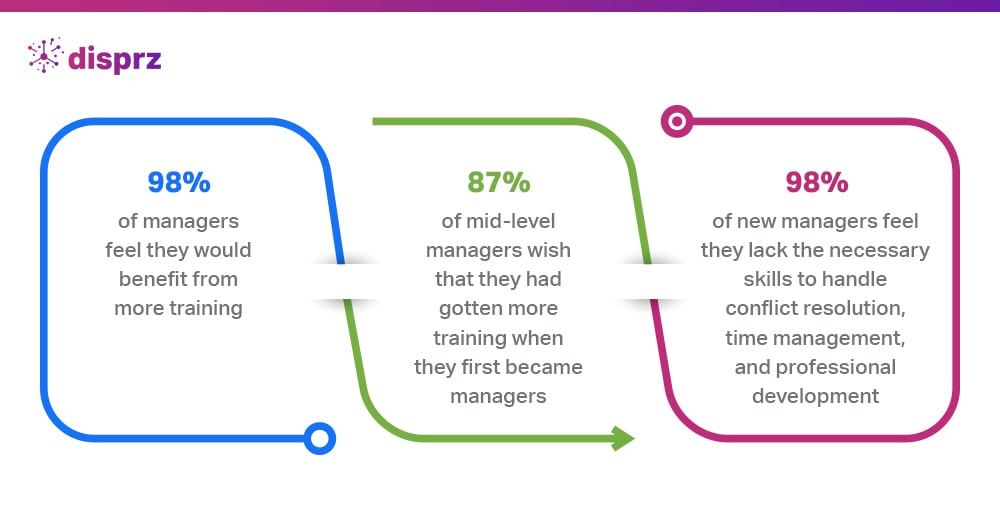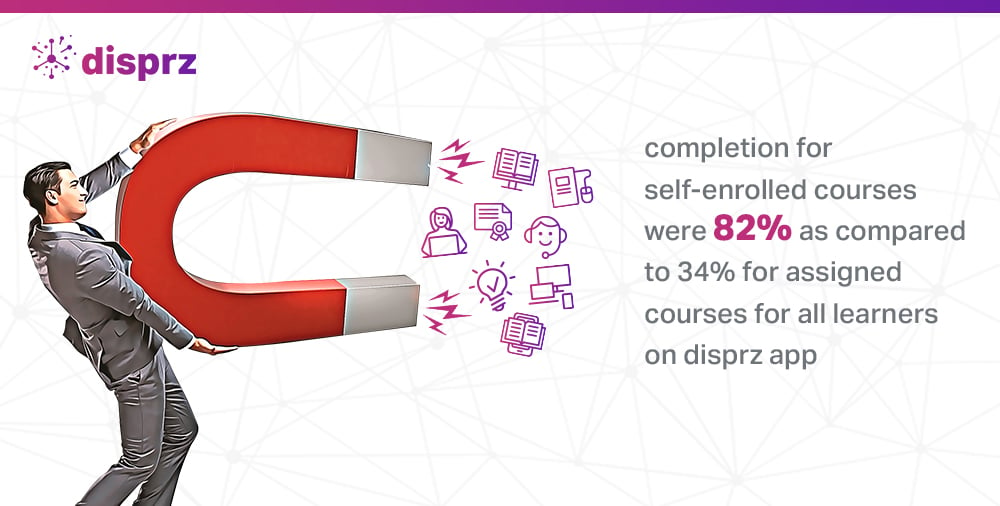There are several blogs, podcasts, ebooks and videos on training and upskilling.
But how many are focused on Managers?
Whether it is Sales, Marketing, Customer Success or any other department, managers are the captain of the ships responsible for navigating the team in the right direction.
Without the right skills, managers find it challenging to deliver optimum performance and get the most out of their employees
Managers need continuous training and upskilling opportunities to keep the team afloat in challenging times and convert the company’s vision into action.
Why is it important to train new managers in 2024?
New managers’ training is often overlooked or taken for granted, with the assumption that they already possess all the necessary knowledge about the project or their role. However, this assumption can lead to significant challenges when managers struggle to handle teams, projects, or tasks effectively. Ultimately, this can result in them being perceived as subpar performers or ineffective managers.
Here are some of the reasons that stress the importance of training managers:
Skill Development
New managers often face challenges transitioning from individual contributors to leaders. They may lack crucial skills such as delegation, time management, and performance feedback. This gap in skills can lead to frustration among team members and hinder overall productivity. Providing training in areas like leadership development, emotional intelligence, and coaching can empower new managers to navigate these challenges effectively.
Effective Communication
Clear and effective communication is the cornerstone of successful leadership. New managers may struggle with communicating expectations, providing feedback, and resolving conflicts. Training programs that focus on active listening, nonverbal communication, and assertiveness skills can significantly enhance a manager's ability to communicate effectively.
Conflict Resolution
Conflict is unavoidable in any workplace, but how it's managed can make a significant difference. New managers may lack the skills to address conflicts constructively, leading to increased tension and reduced team cohesion. Training in conflict resolution techniques, such as mediation and negotiation, can equip managers to handle conflicts professionally and cultivate a positive work environment. The Society for Human Resource Management (SHRM) reports that effective conflict management leads to 60% higher employee engagement levels.
Team Building
Building a strong and cohesive team requires intentional effort and leadership skills. New managers may struggle to motivate team members, foster collaboration, and create a sense of belonging. Training programs that focus on team dynamics, motivation strategies, and diversity inclusion can help managers build and lead high-performing teams. Research by Gallup shows that engaged teams show 21% more profitability.
Decision Making
Effective decision-making is a critical skill for managers at all levels. New managers may feel overwhelmed by the responsibility of making strategic decisions and may lack the frameworks to make informed choices. Training in decision-making processes, risk assessment, and data analysis can empower managers to make sound decisions that drive organizational success. According to a study by McKinsey, companies with strong decision-making processes are 85% more likely to outperform their peers in terms of revenue growth.
3 tips for developing proficient managers by upskilling and coaching

The above stats speak volumes about the need for upskilling and training of managers.
Let’s find out how to upskill and train these managers without further ado.
1) Building on core capabilities and strategic management skills
A manager’s role entails many responsibilities – from setting goals to training team members to achieving the desired business outcome. The right training can help achieve those goals. However, most employees don’t have the time, and others are not interested. The head of the team needs strategic management skills to train and unlock the full potential of their employees.
It is crucial to build the core capabilities and strategic management skills to thrive and inspire employees to perform their best.
Management is an art, and here are three core skills to master this art:
People skills
Most employees step into the shoes of a manager due to their technical or functional skills. However, some of them lack people management skills. That affects their and the team’s performance. Moreover, due to the pressure of delivering, they tend to neglect people and their growth. Providing early leadership training can have a long-term impact on the performance of an individual as a manager.
For every year a company delays leadership development, it costs 7% of their total annual sales.
People skills play a critical role in training the employees. Training on people’s skills can help managers connect with their employees and make skill development programs more relevant to each employee rather than taking a one-size-fits-all approach.
Mentoring skills
With the right support and guidance, employees can put their best foot forward and perform well without micromanagement from the manager. Building mentoring skills can help managers empower the team to work efficiently and address challenges independently. By opening the doors of mentorship, managers can create and seek new opportunities for the team members to achieve positive outcomes. So it’s pivotal to develop learning programs for managers that focus on various aspects of mentoring, from imparting knowledge to sharing experiences and recommending the right assignments.
Communication skills
Miscommunication often leads to misunderstanding, creating hurdles in fulfilling the team’s goals. Focusing on a manager’s communication skills is crucial to avoid mishaps that hamper a team’s performance. Conduct mock calls to prepare the manager for handling challenging scenarios while training the employees. The manager should clearly communicate the objectives, ideas and project to their team members to let them know what’s expected out of them.
2) Focusing on unlocking potential rather than teaching
Sometimes employees have the skills to perform a particular task; all they need is a nudge to unlock their full capabilities. Managers training programs should be directed towards preparing managers to identify employees’ capabilities and leverage them to boost the company’s growth.
Old school teaching doesn’t fit right in the modern corporate world. Managers need training on using advanced technology to help employees identify and bridge performance gaps. Effective learning and development can help managers efficiently toggle between self-paced and push-based learning. The right balance of both can be useful in providing compliance training and giving employees the flexibility to take charge of their skill development process to address their unique learning needs.

3) Being a part of a learner’s journey through constant feedback
Nowadays, managers can effortlessly create a learning journey for the employees by using a modern skilling solution like an LXP(learning experience platform).
However, that’s not the end of the road; constant analysis and feedback are important to get the best returns on the time, efforts and resources invested in creating the learning journey.
Managers need the proper training to be a part of the employee’s learning journey to ensure the employee benefits from the learning and development programs. Sessions on using an analytics builder can help managers slice and dice the learning data to understand the learner’s behaviour and track the course completion rate. Along with monitoring data, managers need training on conducting regular feedback sessions to highlight the areas of improvement and understand the employees’ learning requirements.
Top skills to focus on new manager training
Here are some key Manager training skills that companies should promote and provide apart from the management skills given above.
Problem-Solving and Decision-Making
Managers need to be adept at analyzing complex situations, identifying root causes of problems, and making informed decisions. Training in problem-solving frameworks, critical thinking, and decision-making processes can enhance their ability to navigate challenges effectively.
Time Management and Prioritization
Effective time management is essential for managers to prioritize tasks, meet deadlines, and optimize productivity. Training in time management techniques, task prioritization strategies, and delegation skills can help managers maximize their efficiency and focus on high-impact activities.
Strategic Thinking
Managers must possess a strategic mindset to align their actions with organizational goals and drive long-term success. Training in strategic planning, business acumen, and market analysis can enable managers to think strategically, anticipate trends, and make proactive decisions.
Conflict Resolution and Negotiation
Conflict is inevitable in any workplace, and managers need to be skilled in resolving conflicts and negotiating win-win solutions. Training in conflict resolution techniques, mediation, and negotiation skills can equip managers to handle conflicts constructively and maintain positive relationships within teams.
Change Management
In today’s market landscape, managers must be capable of leading and managing change effectively. Training in change management principles, communication strategies during change, and resilience-building can help managers navigate transitions, mitigate resistance, and drive successful change initiatives.
Performance Management
Managers play a critical role in driving employee performance and development. Training in performance management processes, feedback delivery, goal setting, and coaching skills can empower managers to support their team members, enhance performance, and foster a culture of continuous improvement.
Conclusion
With digital acceleration and the rise of the hybrid work culture, it’s more important than ever that the head of the team has the right skills to train and make the team future-ready. Managerial learning and development is the need of the hour to build proficient managers who can efficiently provide effective learning opportunities to the team to achieve short and long-term business goals.
Using a complete skilling suite like Disprz, you can effortlessly train your managers by creating a personalized learning platform. Features like low-touch high-scale onboarding, AI-based recommendation, and role-based skill benchmarking can help make managers job-ready from the first day. Moreover, you can identify the trending managerial skills and upskill the head of the team in real time. The best part is that disprz is a solution that collars of different colors can use, whether an executive or a manager; all can leverage this technology to expand their skill set. See a preview to find how disprz can help upskill employees at different levels.









